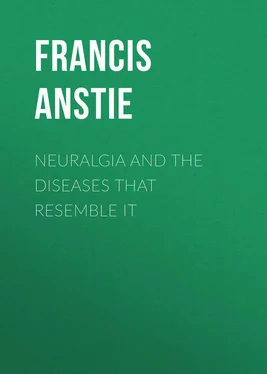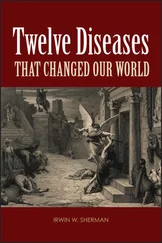Francis Anstie - Neuralgia and the Diseases that Resemble it
Здесь есть возможность читать онлайн «Francis Anstie - Neuralgia and the Diseases that Resemble it» — ознакомительный отрывок электронной книги совершенно бесплатно, а после прочтения отрывка купить полную версию. В некоторых случаях можно слушать аудио, скачать через торрент в формате fb2 и присутствует краткое содержание. Жанр: foreign_antique, foreign_prose, на английском языке. Описание произведения, (предисловие) а так же отзывы посетителей доступны на портале библиотеки ЛибКат.
- Название:Neuralgia and the Diseases that Resemble it
- Автор:
- Жанр:
- Год:неизвестен
- ISBN:нет данных
- Рейтинг книги:5 / 5. Голосов: 1
-
Избранное:Добавить в избранное
- Отзывы:
-
Ваша оценка:
- 100
- 1
- 2
- 3
- 4
- 5
Neuralgia and the Diseases that Resemble it: краткое содержание, описание и аннотация
Предлагаем к чтению аннотацию, описание, краткое содержание или предисловие (зависит от того, что написал сам автор книги «Neuralgia and the Diseases that Resemble it»). Если вы не нашли необходимую информацию о книге — напишите в комментариях, мы постараемся отыскать её.
Neuralgia and the Diseases that Resemble it — читать онлайн ознакомительный отрывок
Ниже представлен текст книги, разбитый по страницам. Система сохранения места последней прочитанной страницы, позволяет с удобством читать онлайн бесплатно книгу «Neuralgia and the Diseases that Resemble it», без необходимости каждый раз заново искать на чём Вы остановились. Поставьте закладку, и сможете в любой момент перейти на страницу, на которой закончили чтение.
Интервал:
Закладка:
Neuralgia of the Heart. – If there be any hesitation in treating this disease as exactly conterminous with angina pectoris, it can, I think, be only reasonably justified on two grounds: In the first place, it may be urged that acute pain of the neuralgic type is not always present in angina pectoris; and, secondly, it may be urged that many cases of painful neurosis of the heart have been observed, in which the recurrence of pain with some amount of cardiac embarrassment has gone on for years, whereas the popular conception of true angina almost necessarily involves rapid fatality.
There is doubtless some force in these objections, especially in the second, for it does seem rather inconvenient to call by the same name so deadly a disorder as the worst form of angina, and so comparatively harmless a malady as some of those instances of chronic tendency to spasmodic pain of the heart which are not very uncommon, and in which the patient survives, perhaps, to an old age. Yet, after all, there is the greatest difficulty in drawing any rational line of distinction; for the basis of the affection seems the same in every case, whether pain or spasm be the predominant feature, and whether the course of the disease be long or short. All that appears to be necessary for its production is a certain originally neurotic temperament (with possibly some congenital weakness or some post-natal disease of that part of the spinal-cord centres which Von Bezold has described as furnishing three-fourths of the propulsive power of the heart) and the presence of almost any kind of difficulty or embarrassment of the action of the heart. The most common source of this embarrassment is perhaps failure of nutrition in the muscular walls of the heart, from disease of the coronary arteries. Indeed, it is not known that any organic change of the heart or great vessels, even of the slightest kind, is necessary to the production of angina; on the contrary, there is every reason to think that mere fatigue and depression may bring on the attacks in persons of a strongly nervous temperament. For my own part, I am inclined to believe, however that there really always is disease somewhere in the cardiac centre of the spinal cord, though that disease may consist in no more than a disposition to minute interstitial atrophy. But we shall say more about this presently.
It is at any rate certain that cardiac neuralgia is always a most grave complaint, from the almost total uncertainty whether succeeding attacks will not involve a fatal amount of spasm. As for the expression angina pectoris, it is just one of those mischievous terms which, arising out of the mystified ignorance in which the elder physicians found themselves as to the pathology of internal diseases, have since been attached in turn to various definite organic changes, with none of which they had any essential connection; and it is therefore much to be wished that it could be altogether done away with. At the same time, there is so much that is peculiar in the case of cardiac neuralgia, owing to the importance of the organ affected, that it will be necessary here to treat not merely its symptoms, but also its diagnosis, prognosis, etiology, pathology, and treatment, in a separate and continuous manner.
Clinical History and Symptoms. – Cardiac neuralgia usually shows itself for the first time with considerable abruptness. The patient may or may not have been consciously ill before the actual seizure, but it rarely happens, even when the heart has notoriously been the subject of some organic disease, that there has been any thing to lead him to expect the kind of attack from which he now suffers. In the midst of some little unusual effort, or even without this kind of provocation, suddenly the patient is attacked with severe pain, usually at the lower part of the sternum; this pain darts through to the back and left shoulder, and nearly always runs down the left arm. Sometimes, indeed, it is felt acutely over a large area of the chest, and runs down both arms; this is the case in a patient now under my care, in whom the affection is more obviously a neurosis, and less attended with coarse organic changes, than is usually the case. Along with the pain, which is always very distressing, but varies greatly in severity in different cases, there is a variable amount of another sensation which can be compared to nothing but cramp, or rather compression; the patient usually describes it as feeling as if some one were grasping the heart in his hands, and, when this sensation is at all prominent, the idea of impending death is most strongly impressed on the sufferer's mind. His outward appearance seems to confirm the idea. In cases where the sense of compression is great, the face is of an ashen gray; the lips white, with a faint livid tinge; the pulse small, feeble, and unrhythmical, or imperceptible, at the wrist; cold perspiration breaks out upon the face; in short, all the signs of approaching dissolution are present. In cases where the suffering is chiefly or entirely confined to severe pain, of a darting or burning character, the state of the circulation is often different. The heart bounds against the ribs, in rapid and painful palpitation, the face is flushed deep crimson, the pulse at the wrist is large, bounding, but very compressible; in fact, the outward appearance of the patient is so different from that of one who suffers from the more depressing kind of angina, that it is difficult to consider the two affections as essentially similar. But there can be no question, if we carefully examine the matter, that they are mere varieties of the same disorder, especially as they both may successively occur in the same person.
The course of cardiac neuralgia varies extremely. Supposing the malady to be purely neurotic, and not complicated with organic disease, which forms a constant source of cardiac embarrassment, then the patient may only experience one or two attacks, under some special circumstances of exhaustion, which may never recur; or, on the other hand, he may develop a strong tendency to cardiac neuralgia which may beset him during almost any number of years. In the latter case, it is an even chance whether the patient will at last sink from the anginal affection; for, even supposing him to escape any fatal intercurrent disease of an independent nature, the fatal event may be at last produced by cerebral softening, or by apoplexy, or other central nervous disease. In fact, the frequency with which the latter kind of termination occurs is very significant of the essential nature of the disease.
The manner in which cardiac neuralgia commences varies very greatly. In the celebrated case of Dr. Arnold, the first attack did not occur till he was forty-seven years of age; it at once assumed full intensity, and proved fatal in two hours and a half. There is also reason to believe that Dr. Arnold's father died in a first attack of angina. I have myself known a first attack prove fatal in the course of an hour; there was very considerable ossification of the coronary arteries and fatty degeneration of the heart-walls. Again, there are many cases which commence gradually, and with great mildness, and with little appearance of danger to life in the first attacks; but the subsequent attacks are progressively more severe and dangerous up to a fatal result, after weeks, months, or years. On the other hand, I have known three instances in which the first attacks of spasmodic heart-pain very nearly proved fatal, but the subsequent fits were milder (in one there was no second attack): all those patients are living, six, eight, and three years respectively, after their first attacks.
It can hardly be doubted that neuralgic spasm is the true cause of sudden death in some cases of stenosis of the aortic orifice, which, but for some accidental circumstances, would not have died suddenly at all, but would have gone through a long and gradual course of deterioration. I particularly remember an instance in which extreme and calcareous constriction of the aortic orifice, in a boy not yet come to puberty, was entirely unsuspected, until one day, in running fast, he screamed out and fell down, and was almost instantaneously dead. I remember another case very similar, in which extreme mitral constriction produced almost as sudden death, apparently from painful spasm, under the same kind of exertion. On the other hand, sudden death, when produced by the form of heart-disease which (as Dr. Walshe points out) is most likely to cause such a catastrophe, viz., aortic regurgitation pure, without hypertrophy, does not seem to be due to painful spasm, but to simple and complete failure of the muscular power, and is perhaps partly of the nature of paralysis from a syncopal condition of the brain, the unhypertrophied heart having become for the moment unable to supply blood enough to the brain to carry on nervous function at all.
Читать дальшеИнтервал:
Закладка:
Похожие книги на «Neuralgia and the Diseases that Resemble it»
Представляем Вашему вниманию похожие книги на «Neuralgia and the Diseases that Resemble it» списком для выбора. Мы отобрали схожую по названию и смыслу литературу в надежде предоставить читателям больше вариантов отыскать новые, интересные, ещё непрочитанные произведения.
Обсуждение, отзывы о книге «Neuralgia and the Diseases that Resemble it» и просто собственные мнения читателей. Оставьте ваши комментарии, напишите, что Вы думаете о произведении, его смысле или главных героях. Укажите что конкретно понравилось, а что нет, и почему Вы так считаете.












